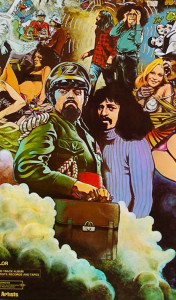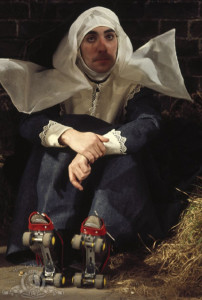Today is the 26th anniversary of the start of the Velvet Revolution, a peaceful student-led anti-government protest movement that led to the fall of communism in Czechoslovakia in December 1989. The name of the revolution stemmed directly from Lou Reed’s Velvet Underground, the house band of Andy Warhol’s Silver Factory art gallery/performance space in the 1960s. The Velvets’ stripped-down, subterranean sound and nihilistic attitude made them a favorite among avant-garde Czechs seeking mind-expanding alternatives to bland Soviet-spun art, literature, and music.
Within six weeks of the first demonstration on November 17, a playwright-poet-philosopher who had been imprisoned as a leading dissident became the country’s first democratically elected president in 41 years. His name was Vaclav Havel. He loved rock and roll, and was undoubtedly the first head of state to invite rockers to share their ideas. The photo above shows him with Lou Reed, Frank Zappa, and the Rolling Stones: all the president’s men.
During a trip to the U.S. in either 1967 or 1968, Havel bought a copy of a Velvet Underground album; no one is really sure if it was the band’s debut disc or “White Light/White Heat.” Said music writer Rob Jovanovic, “Havel took it home, along with Frank Zappa’s debut, and managed to smuggle it through Customs. Soon it was being copied and passed around the Prague underground, influencing the avant-garde set to play secretive gigs around the capital…” When Havel met Reed for the first time, early in his presidency, he was rumored to have said, “Did you know I am president because of you?” Following their first encounter, the hard-to-impress Lou Reed described Mr. Havel as a “heroic, intellectual, music-loving amazing person.”
The very serious Frank Zappa, whom Havel appointed a special “cultural ambassador,” was overcome with emotion when the president told him that Czechs used to be beaten by the Secret Police for listening to his music. In fact, Zappa’s song “Plastic People” inspired the name of a popular dissident Czech band, The Plastic People of the Universe, formed in 1968 following the Soviet clampdown that ended Czechoslovakia’s short-lived Prague Spring. Following the arrest and imprisonment of the group’s members in 1976, Havel declared that the Plastics were defending “life’s intrinsic desire to express itself freely, in its own authentic and sovereign way.” This led to the creation of a human rights organization known as Charter 77, a group of 242 petition signers who called for the human rights guaranteed under the 1975 Helsinki accords. Havel’s role in this movement, and his subsequent creation of the Committee for the Defense of the Unjustly Prosecuted in 1979, led to multiple imprisonments.
The Rolling Stones, bad-boys of the British rock scene, appealed to Havel’s rebellious nature. “For me, the Rolling Stones have always been a sort of counterweight to the more amiable, more lyrical and often more easygoing Beatles,” the president told Rolling Stone writer Roman Lipcik in the magazine’s October 4, 1990, issue. “I used to listen to their music often. Songs like ‘Satisfaction’ can hardly be forgotten.”
The Stones invaded Prague on August 18, 1990, three days before the twenty-second anniversary of the Soviet-led invasion of Czechoslovakia. Mick Jagger appeared on Czech state TV with a rallying cry: the Stones are rolling into town! Posters covered the city, announcing the tanks are rolling out! Keith Richards noted the president’s playful side: “We gave Vaclav this little white remote control with a tongue on it. He walked around lighting up the palace, and suddenly statues came alive. He was like a kid, pushing buttons and going, whoa!”
Czechoslovakia split into two separate entities in early 1993: the Czech Republic and Slovakia. I made 10 business trips to the CR in the early ’90s, during the height of Prague Spring Redux. I never had a chance to encounter any of my rock idols while there, but I could feel the spirit of rock and roll in my soul as I walked the cobblestone streets of marvelous, mysterious Prague, knowing that music truly did bring power to the people.
RIP, President Havel: October 5, 1936 – December 18, 2011.
RIP, Frank Zappa: December 21, 1940 – December 4, 1993.
RIP, Lou Reed: March 2, 1942 – October 27, 2013.
Here are the Plastic People of the Universe, with their rendition of the Velvet Underground’s “Run Run Run.”
© Dana Spiardi, Nov 17, 2015
]]>
 “Ladies and gentlemen, you can go mad on the road. That is precisely what this film is all about.” So goes the intro to Zappa’s “surrealistic documentary,” which opened at London’s Piccadilly Classic Cinema in the U.K. on this date in 1971. The film parodied the on-the-road touring experiences of his art-rock band, The Mothers of Invention. Ringo Starr played Larry the Dwarf (masquerading as Zappa), and Academy Award nominated actor and folk singer Theodore Bikel played Rance Muhammitz, a fascist dictator of sorts. The Who’s Keith Moon appeared as a pop star disguised as a groupie disguised as a nun. Need I go on?
“Ladies and gentlemen, you can go mad on the road. That is precisely what this film is all about.” So goes the intro to Zappa’s “surrealistic documentary,” which opened at London’s Piccadilly Classic Cinema in the U.K. on this date in 1971. The film parodied the on-the-road touring experiences of his art-rock band, The Mothers of Invention. Ringo Starr played Larry the Dwarf (masquerading as Zappa), and Academy Award nominated actor and folk singer Theodore Bikel played Rance Muhammitz, a fascist dictator of sorts. The Who’s Keith Moon appeared as a pop star disguised as a groupie disguised as a nun. Need I go on?
Die-hard Zappanistas and chemical connoisseurs no doubt found the film delightful. The casual viewer could make no sense of it. But, the movie was original and visually provocative enough to draw praise from two of America’s leading film critics. Since I can barely muster the words to describe the images and their impact on the psyche, I’ll leave it to the experts.
Vincent Canby of the New York Times wrote, “No self-proclaimed surrealistic documentary can be all bad when it has a score composed by Frank Zappa, the Orson Welles of the rock music world….It cheerily evokes the image of groupies, warm beer, cheeseburgers, overflowing ash trays, efficient plumbing and inefficient air-conditioning, which freezes the air without cleaning it, in an endless chain of identical bed-sitters that are the homes-away-from-home for the members of a touring rock group.” Wow, it sounds like Mr. Canby knows that setting a little too well.
 Roger Ebert of the Chicago Sun Times praises the technology behind the project: “We have been hearing for a long time that videotape is going to revolutionize filmmaking, and now here is the vanguard of the revolution. Whatever else it may be, Frank Zappa’s ‘200 Motels’ is a joyous, fanatic, slightly weird experiment in the uses of the color videotape process. If there is more that can be done with videotape, I do not want to be there when they do it…The movie is so unrelentingly high that you even wish for intermissions….It is the kind of movie you can barely see once: not because it’s simple, but became it’s so complicated that you finally realize you aren’t meant to get everything and sort everything out. It is a full wall of sight-and-sound input, and the experience of the input — not its content, is what Zappa’s giving us. ‘200 Motels’ is out of Howard Johnson by Tinker Bell, with Aquarius setting.” Hmmm, I wonder if the late, great Mr. Ebert was “unrelentingly high” when he screened the flick!
Roger Ebert of the Chicago Sun Times praises the technology behind the project: “We have been hearing for a long time that videotape is going to revolutionize filmmaking, and now here is the vanguard of the revolution. Whatever else it may be, Frank Zappa’s ‘200 Motels’ is a joyous, fanatic, slightly weird experiment in the uses of the color videotape process. If there is more that can be done with videotape, I do not want to be there when they do it…The movie is so unrelentingly high that you even wish for intermissions….It is the kind of movie you can barely see once: not because it’s simple, but became it’s so complicated that you finally realize you aren’t meant to get everything and sort everything out. It is a full wall of sight-and-sound input, and the experience of the input — not its content, is what Zappa’s giving us. ‘200 Motels’ is out of Howard Johnson by Tinker Bell, with Aquarius setting.” Hmmm, I wonder if the late, great Mr. Ebert was “unrelentingly high” when he screened the flick!
To borrow a line from Frank himself, watching “200 Motels” is “…a bit like eating a sausage: you don’t know what’s in it, you probably shouldn’t know what’s in there; but if it tastes good, well there you go.” And that’s a great philosophy to have when you’re out on the road looking for adventure. So, take a chance…save some dough on your next vacation and book a room in a minimalist dive. You’ll then be able to entertain your friends (or, like me, bore them to death) with your “motel from hell” stories for the next 20 years.
Now, sit back, grab whatever mind-altering substance you might have on hand, and enjoy the trailer:
© Dana Spiardi, Dec 16, 2013
]]>